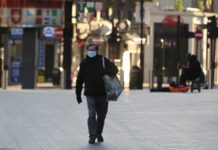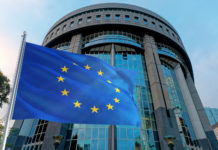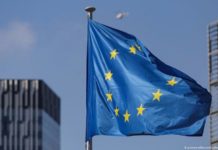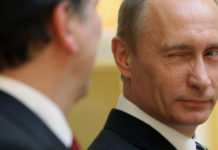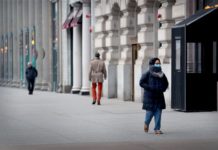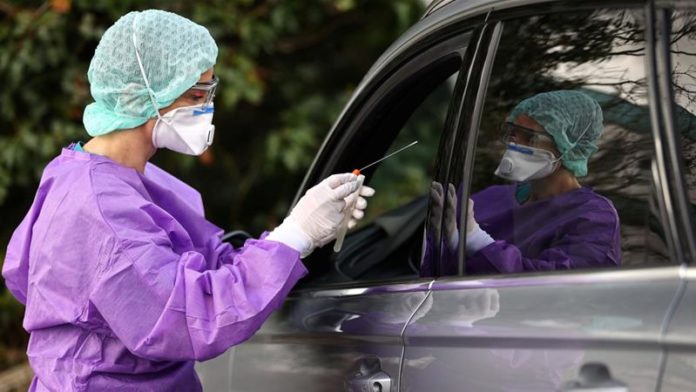
The federal and state governments have decided on drastic measures to contain the spread of the virus
Next week, Germany government will discuss how to proceed in the Corona crisis. Soldiers could help with possible rule loosening. Experts are presenting guidelines. And a survey shows how the Germans feel about compulsory masks.
Berlin (dpa) – Defence Minister Annegret Kramp-Karrenbauer has offered broad support for the German Armed Forces in gradually phasing out restrictions to contain the corona virus.
“We have a lot of heads, a lot of hands that are willing to help”, Kramp-Karrenbauer told the German Press Agency in Berlin. “What matters now is what countries are asking of us.” For example, it is conceivable that health agencies could be used to trace chains of infection. Soldiers could also help organize shopping when people cannot leave their homes.
The federal and state governments have decided on drastic measures to contain the spread of the virus. There are calls for relaxation, especially from the business community, but President Frank-Walter Steinmeier called for patience and solidarity on Saturday.
On Wednesday there will be a discussion on how to proceed. At another switching conference between Chancellor Angela Merkel and the Minister Presidents on April 19, it will probably be decided whether parts of the restrictions can be lifted or changed.
Following the National Academy of Sciences Leopoldina, a group of experts appointed by the government of North Rhine-Westphalia has now also presented guidelines and proposals for relaxation. Their paper has been submitted to the “Frankfurter Allgemeine Sonntagszeitung” and the dpa. The paper states that relaxation can only be considered when it is clear that the health care system is “foreseeably not overburdened” and the conditions for better “monitoring” the crisis have been created. Then, however, the return to normality could be “gradually forced”.
In an enclosed letter to Chancellor Angela Merkel (CDU) and the heads of government of the other federal states, NRW Prime Minister Armin Laschet (CDU) emphasised that “an open, transparent debate on the way out of the crisis and a roadmap to responsible normality” was needed. The expert paper and a study on the Heinsberg district particularly affected by the Corona epidemic should “contribute to the substantive basis for our joint consultations next week”. Merkel had said on Thursday that when relaxing the strict rules for people and the economy, one must proceed in small steps and observe the consequences.
The 15-page paper of the NRW Expert Council states among other things
– MEDICAL SECTOR: The priority is to expand medical capacities as quickly as possible. Better capacity management is needed, especially for intensive care beds with or without ventilation options. These must be recorded in real time. In addition, better accessibility to the health authorities and a better distribution of information between them is necessary.
– TESTING PHASE: The target is to increase the number of coronavirus tests to up to 500,000 per day. This would require a rapid build-up of the testing infrastructure, also involving additional laboratories, and the establishment of mobile test stations with the support of the Federal Agency for Technical Relief, the German Armed Forces and the Red Cross. The test procedures should be expanded when the infrastructure is ready. People with symptoms and confirmed contacts should always be tested. The chains of infection should also be traced as completely as possible.
– SCHOOLS AND KINDERGARTEN: One possible way to achieve normality could be to “gradually re-admit individual areas of public life”. These include schools, universities and the retail trade. Schools, for example, should have staggered classes and differences according to age. In day-care centres and in “face-to-face teaching”, teachers who do not belong to at-risk groups should first and foremost work. Childcare in daycare centres and the (partial) opening of schools could give employees and the self-employed more freedom.
The experts assume that the old freedoms can only be regained slowly. It must be clear that there will be setbacks. It is highly probable that the country will be repeatedly confronted with a renewed increase in the number of infections. Economic activities would have to be permitted again as quickly as possible and as far as justifiable. The paper goes on to say: “Major events such as Bundesliga soccer matches with spectators, but also trade fairs and congresses will not be able to take place in the foreseeable future.
Finally, it was also discussed whether the wearing of protective masks should be made compulsory when measures are relaxed. Mecklenburg-Western Pomerania’s State Premier Manuela Schwesig (SPD) told the newspaper “Bild am Sonntag”: “We will only be able to boost public life step by step. And we need additional measures such as face masks for everyone”.
When asked in which areas the German Armed Forces could help, especially in the gradual exit from the harsh restrictions towards normal life, Kramp-Karrenbauer named the health authorities. There was also a kind of health office in the Bundeswehr. “We are building up strong units there for the tracking of infections, so that we can well organize containment – perhaps in conjunction with an app.” A number of German states are thinking about requesting soldiers as reinforcements in public health offices. Soldiers there should not perform sovereign duties, but rather interview people on the phone and find out who has had contact with whom. “In this way we can help to create the best possible picture”, said the Minister.
According to a survey conducted by the polling institute YouGov on behalf of the dpa, the majority of Germans are in favour of making the wearing of masks compulsory at least in certain places. According to the survey, 33 percent want to restrict such a duty to supermarkets, as is the case in Austria. A further 21 percent think that protective masks should generally be worn in public. Only 37 per cent are against making protective masks mandatory, 9 per cent did not give any information. In Austria, the government had decreed the wearing of protective masks in supermarkets at the end of March. In Germany, such an obligation exists so far only in the Thuringian city of Jena.



